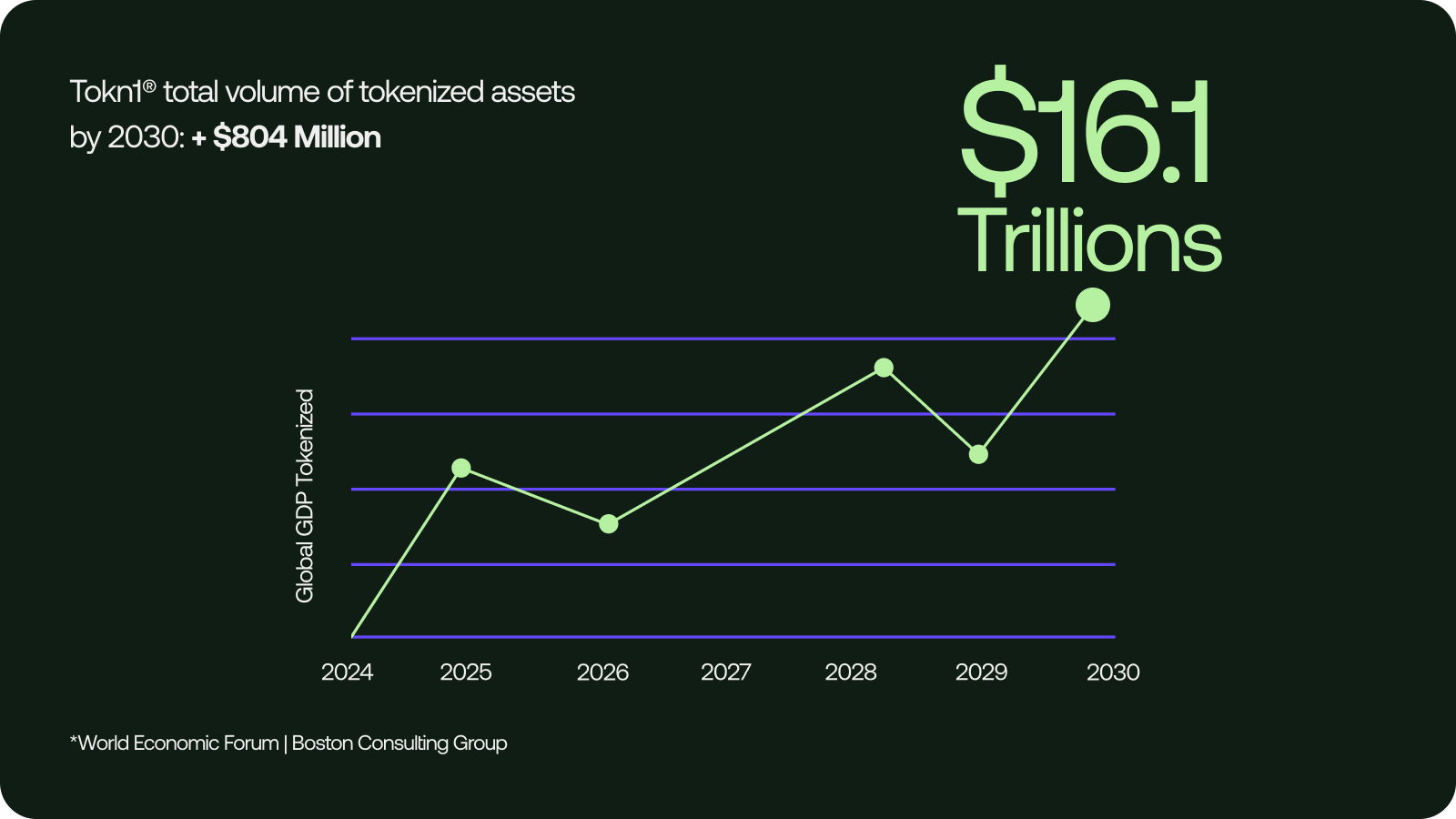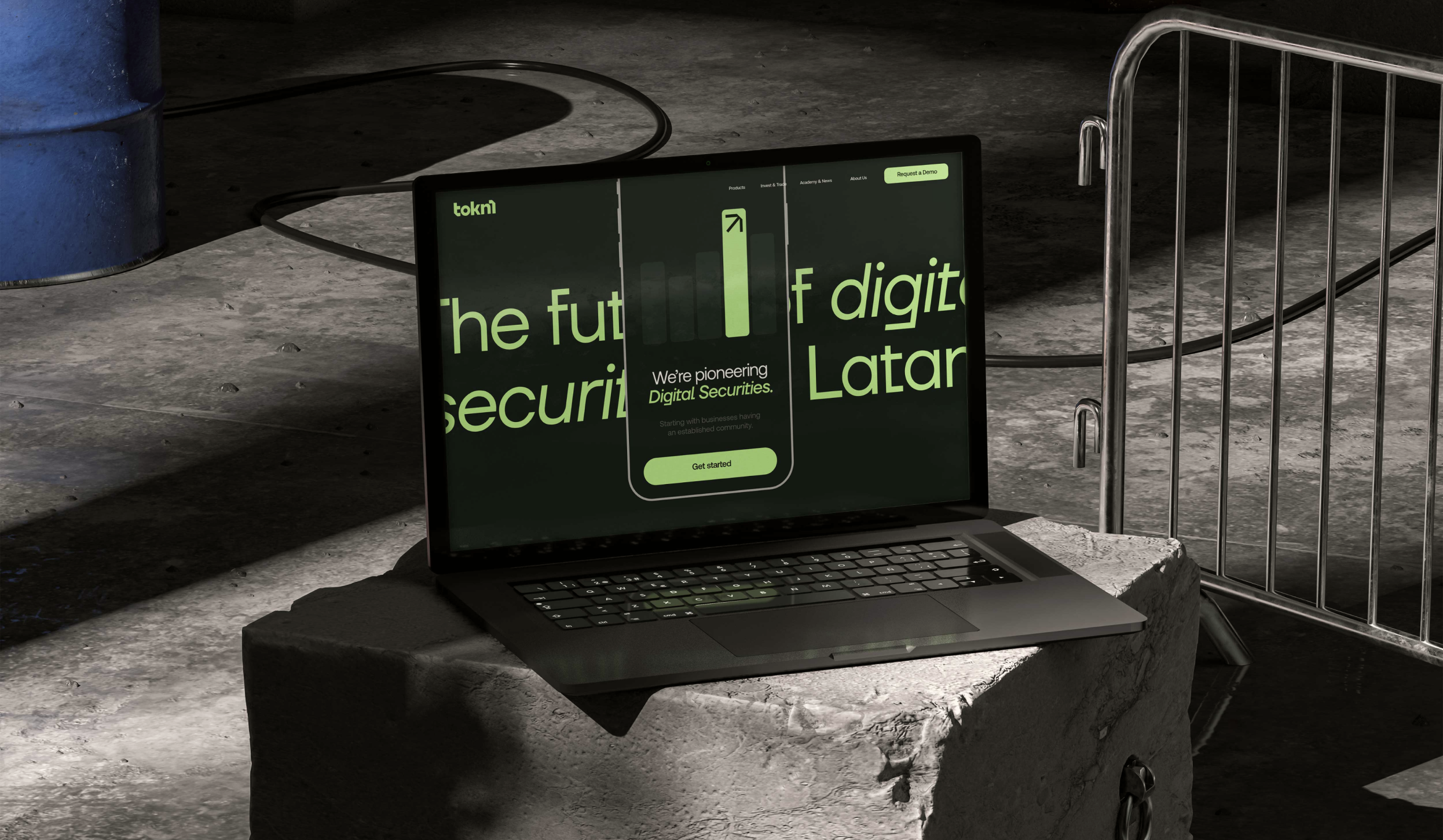The Future is Tokenized: 10% of Global GDP by 2030
The financial transformation driven by tokenization
Tokenization represents a seismic shift in how we perceive and interact with assets, transcending traditional boundaries and unlocking unprecedented opportunities in the financial sphere. At its core, tokenization entails the conversion of real-world assets – encompassing everything from real estate and fine art to commodities and financial instruments – into digital tokens, each uniquely identifiable and securely recorded on a blockchain.
This process holds immense promise, poised to reshape the global financial landscape in profound ways. By the year 2030, experts project that a staggering 10% of the world’s Gross Domestic Product (GDP), equating to a remarkable $16.1 trillion, will be tokenized. Such a monumental figure underscores the scale of transformation underway, signaling the emergence of a new paradigm in asset management and investment.
Central to the allure of tokenization is its potential to foster heightened transparency, efficiency, and accessibility within financial markets. Traditionally, the realm of asset ownership has been shrouded in opacity, with transactions often mired in layers of intermediaries and paperwork. Tokenization disrupts this status quo by leveraging blockchain technology – a decentralized, immutable ledger – to provide a transparent and tamper-proof record of asset ownership and transactions.
In this new era of asset management, barriers to entry are dismantled, and opportunities for participation are democratized. Fractional ownership of high-value assets becomes not only feasible but commonplace, enabling a broader spectrum of investors to access markets once reserved for the privileged few. Whether it’s investing in a luxury property halfway across the globe or acquiring a stake in a rare piece of artwork, tokenization empowers individuals to diversify their portfolios and seize previously inaccessible investment opportunities.
Moreover, tokenization holds the promise of streamlining and accelerating transaction processes, reducing friction and costs associated with traditional asset transfers. Smart contracts, programmable agreements executed automatically upon meeting predefined conditions, automate the execution of transactions, eliminating the need for intermediaries and expediting settlement times. The result is a leaner, more efficient ecosystem where capital flows more freely, and market liquidity is enhanced.
Yet perhaps the most compelling aspect of tokenization lies in its potential to foster financial inclusion on a global scale. By lowering barriers to entry and broadening access to investment opportunities, tokenization has the power to uplift underserved communities, spur economic development, and drive social progress. From emerging markets where traditional banking infrastructure is lacking to marginalized populations without access to formal financial services, tokenization opens doors previously closed, unlocking pathways to prosperity for millions worldwide.
In essence, the rise of tokenization heralds a new dawn for finance – one characterized by transparency, efficiency, and inclusivity. As we journey towards 2030 and beyond, the transformative impact of tokenization will continue to reverberate across economies and societies, reshaping the way we create, distribute, and manage wealth. In this evolving landscape, those who embrace the potential of tokenization stand poised to thrive in a world where opportunities abound and boundaries dissolve.
Understanding Tokenization
At its essence, tokenization democratizes asset ownership by representing tangible assets such as real estate, artwork, commodities, and financial instruments as digital tokens. These tokens, securely stored on a blockchain, facilitate seamless trading and ownership transfer, transcending geographical boundaries and traditional market constraints.
Tokenization essentially involves the conversion of physical or real-world assets into digital tokens, each of which represents a share or portion of the underlying asset. These tokens are then recorded on a blockchain, providing an immutable and transparent ledger of ownership and transactions.
Unveiling the Benefits
Enhanced Liquidity: Tokenization unlocks liquidity for traditionally illiquid assets, fostering fractional ownership and facilitating smoother market transactions. Investors can now access high-value assets like real estate or artwork without committing to the entire capital outlay, thereby diversifying their investment portfolios.
Increased Transparency: The immutable nature of blockchain technology ensures transparent and tamper-proof transaction records. This transparency fosters trust among investors, as they can verify asset ownership and transaction history with ease, mitigating the risk of fraud and enhancing market integrity.
Cost Efficiency: Smart contracts, self-executing contracts with predefined terms written into code, automate asset transfer and streamline transaction processes. By eliminating intermediaries such as brokers and lawyers, smart contracts reduce transaction costs and processing times, making asset management more cost-effective and accessible to a broader investor base.
The increased liquidity resulting from tokenization can have profound effects on market dynamics. Traditional assets like real estate or fine art, which typically require significant capital outlays and lengthy transaction processes, become more accessible to a wider range of investors. This democratization of access to assets previously reserved for high-net-worth individuals or institutional investors can lead to more efficient markets and greater overall economic growth.
Seizing the Market Opportunity
The projected tokenization of 10% of the global GDP by 2030 underscores a monumental market opportunity. As blockchain adoption proliferates, new investment avenues and financial innovations emerge, attracting a diverse spectrum of investors ranging from retail enthusiasts to institutional players. This burgeoning market presents vast potential for growth and competition, driving further advancements in tokenization technology and infrastructure.
Tokenization not only expands access to investment opportunities but also creates new avenues for capital formation and economic development. By fractionalizing ownership of assets, tokenization enables individuals and businesses to raise capital more efficiently and at lower costs than traditional financing methods. This can stimulate entrepreneurship and innovation by providing access to funding for startups and small businesses that may have previously struggled to secure financing.

Tokenization in Action
Across various industries, tokenization is gaining traction as a catalyst for financial innovation. Real estate stands out as a prime example, with properties being tokenized to enable fractional ownership and enhance liquidity. Similarly, commodities such as gold and oil, along with financial instruments like bonds and equities, are embracing tokenization to broaden market access and expedite transactions.
Tokenization also has the potential to transform how assets are managed and traded in financial markets. By digitizing assets and recording ownership on a blockchain, tokenization streamlines the process of buying, selling, and transferring assets, reducing friction and increasing efficiency. This can lead to lower transaction costs, faster settlement times, and greater market liquidity, benefiting investors and market participants alike.
Navigating Challenges
Despite its promise, tokenization faces several challenges:
Regulatory Compliance: Adhering to evolving regulatory frameworks is paramount for the widespread adoption of tokenization. Robust regulations are necessary to safeguard investor interests and maintain market stability amidst the digital asset revolution.
Technological Integration: Implementing blockchain technology necessitates substantial investment in infrastructure and expertise. Building secure and scalable blockchain platforms capable of processing high transaction volumes is imperative for the seamless operation of tokenized markets.
TOKN1: Spearheading Innovation in LATAM

In Latin America (LATAM), the financial landscape has historically been characterized by various challenges, including limited access to capital, regulatory complexities, and a lack of transparency. However, amidst these challenges lies tremendous potential for innovation and growth, especially with the emergence of blockchain technology and tokenization.
TOKN1 emerges as a pioneering force in LATAM, spearheading innovation in digital securities and tokenization. As the first fully regulated Digital Securities platform in the region, TOKN1 is poised to address longstanding barriers to financial inclusion and empowerment.
Addressing Financial Inclusion
One of the primary goals of TOKN1 is to democratize access to investment opportunities in LATAM. Historically, traditional financial markets have been inaccessible to many individuals and businesses in the region, particularly those lacking significant capital or established credit histories. TOKN1 seeks to bridge this gap by providing a platform for the tokenization of real-world assets, thereby unlocking new avenues for financing and investment.
By enabling fractional ownership of assets and facilitating peer-to-peer trading, TOKN1 empowers individuals and businesses to participate in previously inaccessible markets. Whether it’s investing in real estate, commodities, or innovative startups, TOKN1 offers a level playing field where anyone can engage in wealth creation and portfolio diversification.
Navigating Regulatory Complexity
Navigating the regulatory landscape in LATAM can be challenging, with each country having its own unique set of laws and regulations governing financial markets. However, TOKN1 has positioned itself as a leader in regulatory compliance, working closely with local authorities to ensure adherence to applicable laws and standards.
Through proactive engagement with regulators and policymakers, TOKN1 seeks to foster a supportive environment for digital securities and blockchain innovation in LATAM. By promoting transparency, investor protection, and market integrity, TOKN1 aims to build trust and confidence among stakeholders, paving the way for widespread adoption of tokenization technology.
Fostering Economic Growth
Beyond addressing immediate challenges, TOKN1 is committed to fostering long-term economic growth and prosperity in LATAM. By facilitating access to capital for entrepreneurs, startups, and SMEs (small and medium-sized enterprises), TOKN1 catalyzes innovation and job creation, driving economic development across the region.
Moreover, by tokenizing real-world assets such as infrastructure projects, renewable energy initiatives, and agricultural ventures, TOKN1 channels investment into critical sectors that contribute to sustainable development and social progress in LATAM. This alignment of financial innovation with societal impact underscores TOKN1’s commitment to building a more inclusive and resilient economy for the region.
Building a Thriving Ecosystem
Central to TOKN1’s mission is the creation of a vibrant ecosystem that fosters collaboration, innovation, and growth. Through strategic partnerships with industry stakeholders, including financial institutions, technology providers, and regulatory bodies, TOKN1 aims to create synergies that drive the evolution of digital securities and tokenization in LATAM.
The challenge is bridging the gap between traditional Finance and Web3 infrastructure. So TOKN1 provides a fully regulated solution, becoming the first Digital Securities platform in LATAM. We specialize in the tokenization of Real-World Assets, opening innovative new avenues for financing and investment alike.
Moreover, TOKN1 is committed to nurturing talent and expertise in blockchain technology and financial innovation through education, training, and mentorship programs. By empowering the next generation of entrepreneurs and professionals, TOKN1 lays the foundation for a dynamic and sustainable ecosystem that propels LATAM to the forefront of global innovation.
Conclusion
The tokenization of assets marks a watershed moment in the evolution of the global financial system. With an estimated $16.1 trillion in tokenized assets projected by 2030, the horizon of innovation, investment, and economic prosperity appears boundless. Join TOKN1 as we spearhead the transformation of financial markets, unlocking unparalleled opportunities for investors worldwide.

Stay Updated with TOKN1
For the latest insights and updates on tokenization, follow us on LinkedIn. Embrace the future of finance with TOKN1.
#Tokenization #Blockchain #DigitalAssets #FinancialInnovation #Fintech #GlobalEconomy #InvestmentOpportunities #TOKN1
